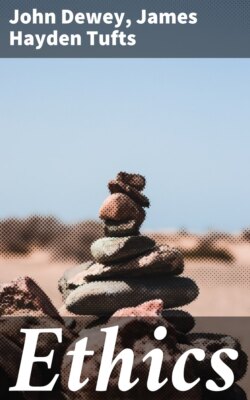Читать книгу Ethics - Джон Дьюи - Страница 27
На сайте Литреса книга снята с продажи.
§ 4. FAMILY LIFE AS AN IDEALIZING AND SOCIALIZING AGENCY
ОглавлениеFamily life, so far as it is merely on the basis of instinct, takes its place with other agencies favored by natural selection which make for more rational and social existence. Various instincts are more or less at work. The sex instinct brings the man and the woman together. The instinct of jealousy, and the property or possessing instinct, may foster exclusive and permanent relations. The parental instinct and affection bind the parents together and thus contribute to the formation of the social group described in the preceding chapter. Considering now the more immediate relations of husband and wife, parents and children, rather than the more general group relations, we call attention to some of the most obvious aspects, leaving fuller treatment for Part III. The idealizing influences of the sex instinct, when this is subject to the general influences found in group life, is familiar. Lyric song is a higher form of its manifestation, but even a mute lover may be stimulated to fine thoughts or brave deeds. Courtship further implies an adaptation, an effort to please, which is a strong socializing force. If "all the world loves a lover," it must be because the lover is on the whole a likable rôle. But other forces come in. Sex love is intense, but so far as it is purely instinctive it may be transitory. Family life needed more permanence than sex attraction could provide, and before the powerful sanctions of religion, society, and morals were sufficient to secure permanence, it is probable that the property interest of the husband was largely effective in building up a family life, requiring fidelity to the married relation on the part of the wife.
But the most far-reaching of the forces at work in the family has been the parental instinct and affection with its consequences upon both parents and children. It contributes probably more than any other naturally selected agency to the development of the race in sympathy; it shares with work in the development of responsibility. It is indeed one of the great incentives to industry throughout the higher species of animals as well as in human life. The value of parental care in the struggle for existence is impressively presented by Sutherland.[21] Whereas the fishes which exercise no care for their eggs preserve their species only by producing these in enormous numbers, certain species which care for them maintain their existence by producing relatively few. Many species produce hundreds of thousands or even millions of eggs. The stickleback, which constructs a nest and guards the young for a few days, is one of the most numerous of fishes, but it lays only from twenty to ninety eggs. Birds and mammals with increased parental care produce few young. Not only is parental care a valuable asset, it is an absolute necessity for the production of the higher species. "In the fierce competition of the animated forms of earth, the loftier type, with its prolonged nervous growth, and consequently augmented period of helplessness, can never arise but with concomitant increases of parental care." Only as the emotional tendency has kept pace with the nerve development has the human race been possible. The very refinements in the organism which make the adult a victor would render the infant a victim if it were without an abundance of loving assistance.[22]
Whether, as has been supposed by some, the parental care has also been the most effective force in keeping the parents together through a lengthened infancy, or whether other factors have been more effective in this particular, there is no need to enlarge upon the wide-reaching moral values of parental affection. It is the atmosphere in which the child begins his experience. So far as any environment can affect him, this is a constant influence for sympathy and kindness. And upon the parents themselves its transforming power, in making life serious, in overcoming selfishness, in projecting thought and hope on into the future, cannot be measured. The moral order and progress of the world might conceivably spare some of the agencies which man has devised; it could not spare this.
